|
|
|
Sort Order |
|
|
|
Items / Page
|
|
|
|
|
|
|
| Srl | Item |
| 1 |
ID:
168472
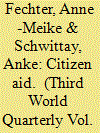

|
|
|
|
|
| Summary/Abstract |
The introduction to this collection brings together, under the umbrella terms of citizen aid and grassroots humanitarianism, interdisciplinary research on small-scale, privately funded forms of aid and development. It notes the steady rise of these activities, including in the Global South as well as North, such as in the context of the recent European refugee crisis. It considers their position vis-à-vis more institutionalised forms of aid; methodological approaches and their challenges; and asks what political dimensions these initiatives may have. It outlines key themes arising from the contributions to the collection, including historical perspectives on ‘demotic humanitarianism’, questions of legitimacy and their apparent lack of professionalisation, motivations of their founders, the role of personal connections, as well as the importance of digital media for brokerage and fundraising. Being mindful of its critiques and implicit power imbalances, it suggests that citizen aid deserves more systematic academic attention.
|
|
|
|
|
|
|
|
|
|
|
|
|
|
|
|
| 2 |
ID:
168480
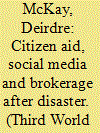

|
|
|
|
|
| Summary/Abstract |
In a crisis, aid providers deliver humanitarian relief across a hierarchy of organisations where influence and capacity map to their scale of operations. On the front lines of crises, ‘citizen aid’ is what small, local and informal groups offer to fellow citizens. These citizen aid groups are well-networked in place and tend to work through longstanding personal relationships. In the Philippines, citizen aid groups frequently support their activities by documenting their work with photos of beneficiaries to solicit donations from within the country and around the world across social media platforms. This paper builds on recent debates on brokerage through a case study of citizen aid in the relief effort after Typhoon Haiyan (2013–2017). Using this case-study approach, we demonstrate how social media has produced novel forms of brokerage shaped by circulating images online. This new kind of brokerage involves a layered network of brokers that both shapes citizen aid efforts and creates new channels for localising aid, enhancing the control of citizen groups in the Global South over aid.
|
|
|
|
|
|
|
|
|
|
|
|
|
|
|
|
| 3 |
ID:
168475
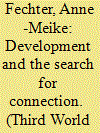

|
|
|
|
|
| Summary/Abstract |
The stated purpose of development is often characterised by the motivation to ‘help’ – that is, to intervene in the lives of others in supportive ways. This paper argues that this perspective has obscured how development activities are also animated by its twin desire to ‘connect’. While this holds significance for development more broadly, it becomes particularly evident in a mode of assistance that has gained prominence more recently. These are privately funded, small-scale projects led by individual founders, here described as ‘citizen aid’. Based on ethnographic research among citizen aid initiatives in Cambodia, the paper argues that the relevance of ‘connecting’ has been insufficiently recognised so far. It explores different aspects of what participants mean by ‘making a connection’, including face-to-face contact, direct experience of aid activities, and their tangible efficacy. It also finds that establishing interpersonal relationships across national, ethnic and cultural differences, while potentially challenging, is a key motivation for those involved. Finally, the paper argues that acknowledging the desire to connect questions notions of the ‘distant stranger’ as the archetypical humanitarian object, highlighting the wish for familiarity and closeness as potentially just as important for motivating and directing assistance to others.
|
|
|
|
|
|
|
|
|
|
|
|
|
|
|
|
| 4 |
ID:
168476
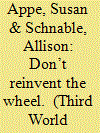

|
|
|
|
|
| Summary/Abstract |
How can support organisations build the capacity of volunteer-driven non-governmental organisations (NGOs)? Citizen aid for relief and development has expanded rapidly in the twenty-first century, and the number of American aid organisations operating in the Global South has grown to nearly 10,000. These grassroots international NGOs – GINGOs – are small-budget, volunteer-driven organisations typically launched by Americans without professional experience in international development or nonprofit management. These groups prize the expressive and voluntaristic dimensions of development work, yet face challenges of amateurism, material scarcity, fragmentation, paternalism and restricted focus. We investigate whether support organisations, whose primary goals are to build the capacity of organisations and strengthen the organisational field, offer solutions to GINGOs’ inherent weaknesses. We draw on 15 semi-structured interviews with a stratified selection of support organisations, including associations tailored towards international development and towards nonprofit work at large. We find that support organisations offer resources to help GINGOs in managerial and administrative domains. Fewer support organisations help GINGOs build technical development skills, and fewer still push GINGOs to critically reflect on their role in development. We find that peer learning and online platforms could help engage GINGOs volunteers in networking spaces, even as their geographic dispersal in the US encourages their fragmentation and isolation.
|
|
|
|
|
|
|
|
|
|
|
|
|
|
|
|
| 5 |
ID:
168474
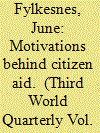

|
|
|
|
|
| Summary/Abstract |
Little is known about citizen aid initiatives originating in Norway, and they are not recognised as part of the official Norwegian development aid. Citizen aid initiatives are personal and small, and by themselves they do not raise large sums of money, nor do they individually have a large-scale development impact. But collectively, their influence on sponsors in Norway and on aid beneficiaries in the Global South might be substantial. Through qualitative interviews, this study explores the motivations of Norwegian founders of citizen aid initiatives, who run small development projects in The Gambia. The study finds that they are motivated by the very characteristics of these citizen aid initiatives which set them apart from formal development organisations. These include the initiatives’ small size, which allows for a personal closeness to and control over the projects. These features are often interconnected with motivations stemming from the founders’ personal experiences. The study finds that, inasmuch as the founders see the need for beneficiaries to be supported, they also experience a need to help themselves. The founders’ identities, as helpers and givers, are both formed and continually reinforced by their personal involvement in this specific type of aid work.
|
|
|
|
|
|
|
|
|
|
|
|
|
|
|
|
|
|
|
|
|